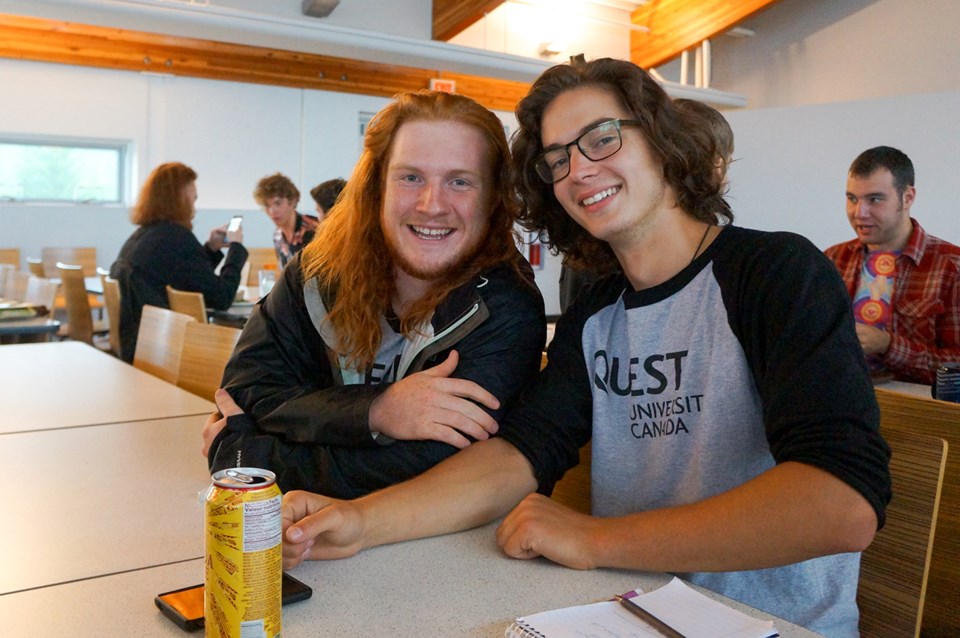On Saturday, Quest University’s cafeteria was abuzz with new students – tearful parents in tow – and returning students chatting over lunch as the new year was set to begin.
With costs for first year topping $45,000 to attend Canada’s first independent, not-for-profit university, some might assume only the offspring of the wealthy need apply. But many of the fresh faces Saturday said they came from average-income homes and had found a variety of ways to gather the necessary funds for school.
New Quest student Carlan Hughes, 18, of Calgary was just getting ready to say good-bye to her mom Saturday before starting her first year on Monday.
She said her parents did help pay, but scholarships for her high school grades cut her tuition down by half, and she plans to work during the school year.
“It’s manageable,” she said, adding she was told during a campus tour that most parents of Quest students make about $60,000 a year.
Third-year student James Blumhagen, who is minister of finance for Quest’s student representative council, said Quest gives out about $10 million per year in need-based bursaries and merit-based scholarships.
He also pointed out that tuition at other universities is publicly subsidized, so students pay less but the cost of education is actually the same.
“It just happens to be that the government isn’t paying for that other portion. I am.”
Getting the money together every year has been a struggle, Blumhagen said. He receives both bursary and scholarship aid from Quest, plus provincial student loans – and he works.
He has heard what he calls the “myth” that all Quest students are from well-off families – that is definitely not the case, Blumhagen said. “It is a struggle every single year to be able to afford to come to Quest for me personally, and I think quite a few students would resonate with what I just stated,” he said. Blumhagen started earning money early; he began working at age 16 to help support his family.
To cut expenses this year, he is going to try to save on food costs.
The first year at Quest he was on a full meal plan, meaning that all his meals were prepaid and he ate on campus. For second year, he was on a half meal plan, so he prepared some of his own food. This year he has decided to forg“It is cheaper to not be on a meal plan,” he said, “just because it allows you to go down into Squamish and actually buy your groceries, which can be much cheaper than paying a company who is making them and has staff and overhead to pay.”
Newly minted Quest president and vice-chancellor Peter Englert said Quest’s campus of students from diverse backgrounds is by design.
“In particular, having a diverse student body greatly enhances campus learning, especially with our unique model based on small classes, active and experiential learning, and seminar-style discussions,” he said. “To help ensure this variety in our student body, we make the university as financially accessible to as many students as possible.”
Englert said some students are provided
scholarships and bursaries that cover the entire cost of their tuition.
For other students, sport talent paves the way to Quest.
Second-year student Vikram Puri of Delta was recruited to be on Quest’s soccer team. Alexander Elliott, who was Puri’s coach in Grade 12, recruited Puri and some other key players for the coach’s first season heading the Kermodes men’s soccer team in 2014.
Puri received scholarships for his sport, and he works as a server at the Keg in Richmond during the summers. He said his parents help a bit, but he is trying to cover his university expenses on his own.
“I try to put as much money as I can into it myself,” he said.
Second-year students Dayne Sabo and Adam Reczka both say scholarships and plenty of paid work during the year and over the summer help provide the funds to attend the school. Both students this year are dorm-floor representatives for first-year students. They live in residence on a floor with the first years and serve as the first line of defence if trouble or homesickness arises. In return, they said, they are paid a small honorarium.
Reczka also worked as the basketball announcer for the Quest team last year, which helped.
“They have a really good employment system here,” he said, adding that students have a variety of paid jobs from which they can choose.
For the summer, Reczka returned to his home in Vernon to work 40 hours a week at the local lumber mill where, although he disliked the work, he made “great pay,” he said. At the end of the summer, all of his money – minus a small amount he used to buy a longboard – went towards his Quest expenses, he said.
Sabo, who is from Qualicum Beach on Vancouver Island, has relied on scholarships and work as a roofer to pay his tuition. To get the scholarships, he said, took time and dedication. He spent countless hours applying and fulfilling the requirements by, for example, writing essays. He said although there are some wealthy students, even they usually come from families where they were taught to work hard, he said. “Everybody who is here worked really hard to get here,” he said.
Things haven’t really changed from previous generations, he said; some students have always had to work to go to school. “My dad had to do the same thing. He worked hard to go to school, ’though his tuition was only $1,500 back then.”




